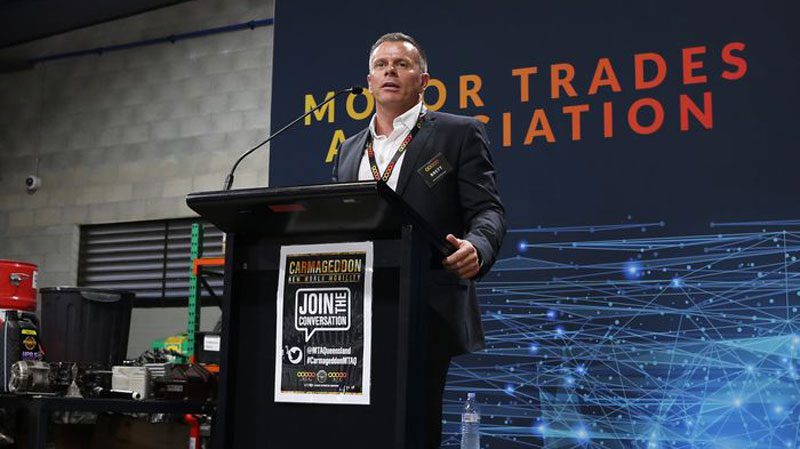> Read the full article here
Petrol car market can not be sustained, says motor trades boss

Amongst the furore in the media this week about whether or not Australia should have a national electric vehicle strategy, one voice in the automotive trades industry has rang loud.
At a tech conference in Brisbane, the chief of the Motor Trades Association of Queensland, Brett Dale – whose organisation advocates for a range of industries including car dealers, mechanics and service stations – said the argument to continue support for vehicles with internal combustion engines is sure to weaken over time.
“We’ll have parallel markets for a time but over the longer term there is no argument to sustain [petrol vehicles],” Dale said at the inaugural QODE conference this week.
“Now that’s contradictory to our industry, there’s lots of businesses which depend on the combustion engine, so it’s a challenge.
“But the reality is that over time there will be less and less need for petrol vehicles,” said Dale, who also recently played host to the MTAQ’s ‘new world mobility’ expo Carmaggeddon which featured Australian electric vehicle startup ACE-EV last month.
Dale’s comments were made in response to German electric vehicle support company Wirelane’s chief Constantin Schwabb who also spoke at the conference.
Pointing out the substantial commitments already made by legacy carmakers overseas to invest in electric cars, Schwabb says it’s only a matter of time before electric cars are cheaper than petrol, and that in 10 years time electric car sales will overtake that of petrol.
“I just came back from the headquarters of Volkswagen, they are about to invest 45 billion euros into the electrification of their entire fleet,” he said.
“Very soon you’ll get to the inflection point where the cost of an electric vehicle will be cheaper than a petrol vehicle, and then market forces take over.”
Indeed, the conversation about electric cars is heating up in Australia, which is a laggard in the transition to clean mobility and reducing levels of transport pollution compared to the majority of other developed countries worldwide.
For the first time ever, a federal election has sparked passionate discussion in Australia of how the transition to zero emissions transport can be done.
The Coalition is refusing to implement any kind of strategy to do so until mid-2020, prompting the ALP to promise an electric vehicle strategy should it win the looming federal election, and the Green’s reiterating its proposal to ban new petrol and diesel vehicles entirely by 2030,
This led to a backflip from the ALP on who should bear the onus of meeting an emissions quota, which quickly copped a critique from the Greens, who accused the ALP of writing policy on the run.
But despite all the political furore, one thing is certain – the switch to electric vehicles is already happening overseas and without its own car manufacturing industry, Australia can only but follow, albeit at the moment very slowly.
The danger in the meantime however, is that without the stringent fuel emissions regulations that are now common overseas, Australia could become nothing but a dumping ground for fuel-heavy, high-emissions vehicles.

